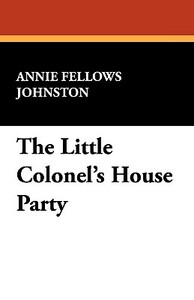Take a photo of a barcode or cover
The writing isn't too bad in this book. It definitely has that 19th century moral tone--be kind, help the poor, etc., yet the characters are not perfect like Elsie Dinsmore.
HOWEVER. The racism and classism just DRIPS off this book. There is a (not so) subtle glorification of the Confederacy, with the references to Lloyd's grandfather, the (regular) Colonel, missing an arm, which he lost in his fight for the "cause he loved so much." (ugh) Looking at it now, these books probably served as part of the propaganda to romanticize the South in the backlash post-Reconstruction.
Being rich and having lots of leisure time and ability to live "graciously" with fancy clothes, etc., is presented as the only real way for "civilized" people to live. Others are considered not really worthy of associating with, unless they are at the receiving end of your charity.
There are black servants at the estate, and though they are clearly not actual slaves (it's 1900 already) they might as well be, for the way they are described. If they are given personalities at all, they are super stereotyped. There is one very horrifying scene in this book where they have a "pillowcase" party. Many friends and neighbors are invited to a kind of masquerade, where everyone comes draped in sheets and pillowcases, and they "bid" on each other to get a partner for the games. It's framed as an innocent party where people are trying to guess each other's identity and ending up with different partners than they thought. Yet, yikes! Even if the servants were informed about the party, and they probably were, since they had to set things up, make food, etc., can you imagine how terrifying for them for crowds of people in white sheets and hoods to be coming up the driveway? How incredibly thoughtless. Unless, of course, you didn't consider the servants to be actual people...
AND--how odd that Lloyd turns out not to be the main character. This book is much more about Lloyd's guests at the party and their own back stories.
From a historical perspective, I am glad to have read it, but I would definitely NOT give this to a child without a great deal of context. The lessons of be kind and helpful do not seem to extend to those who don't look like you.
HOWEVER. The racism and classism just DRIPS off this book. There is a (not so) subtle glorification of the Confederacy, with the references to Lloyd's grandfather, the (regular) Colonel, missing an arm, which he lost in his fight for the "cause he loved so much." (ugh) Looking at it now, these books probably served as part of the propaganda to romanticize the South in the backlash post-Reconstruction.
Being rich and having lots of leisure time and ability to live "graciously" with fancy clothes, etc., is presented as the only real way for "civilized" people to live. Others are considered not really worthy of associating with, unless they are at the receiving end of your charity.
There are black servants at the estate, and though they are clearly not actual slaves (it's 1900 already) they might as well be, for the way they are described. If they are given personalities at all, they are super stereotyped. There is one very horrifying scene in this book where they have a "pillowcase" party. Many friends and neighbors are invited to a kind of masquerade, where everyone comes draped in sheets and pillowcases, and they "bid" on each other to get a partner for the games. It's framed as an innocent party where people are trying to guess each other's identity and ending up with different partners than they thought. Yet, yikes! Even if the servants were informed about the party, and they probably were, since they had to set things up, make food, etc., can you imagine how terrifying for them for crowds of people in white sheets and hoods to be coming up the driveway? How incredibly thoughtless. Unless, of course, you didn't consider the servants to be actual people...
AND--how odd that Lloyd turns out not to be the main character. This book is much more about Lloyd's guests at the party and their own back stories.
From a historical perspective, I am glad to have read it, but I would definitely NOT give this to a child without a great deal of context. The lessons of be kind and helpful do not seem to extend to those who don't look like you.
I want a house party! This reminded me of some of the later Betsy-Tacy novels, which I adored.
the little colonel is so comforting -- and historically interesting, too. i spent quite a while researching what betty might have had the first time she had the measles (since you really can't get it twice), and, thanks to my previous reading, i think she might actually have had variola minor, which was going around the area at the time. connections!


